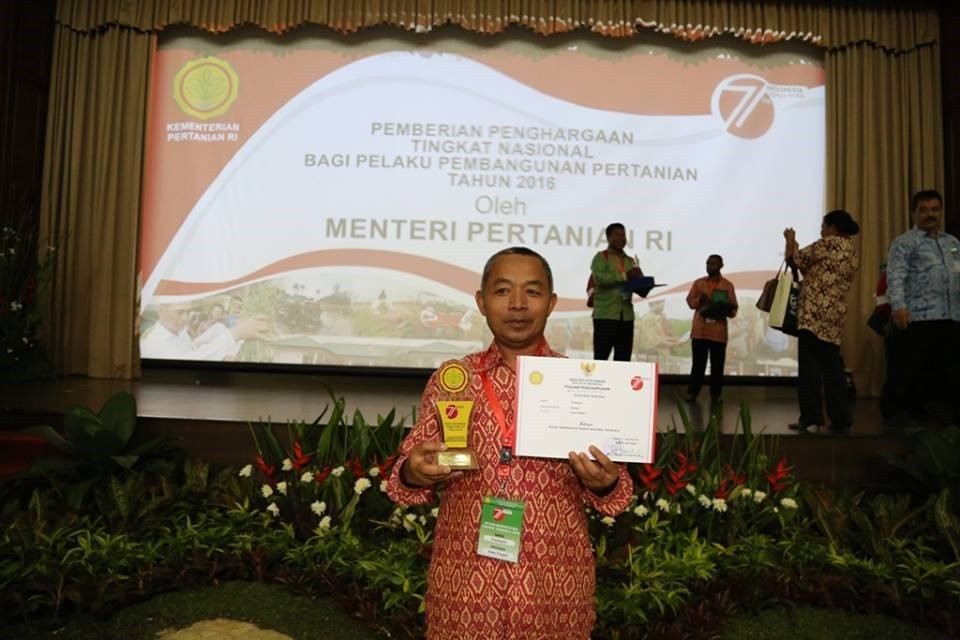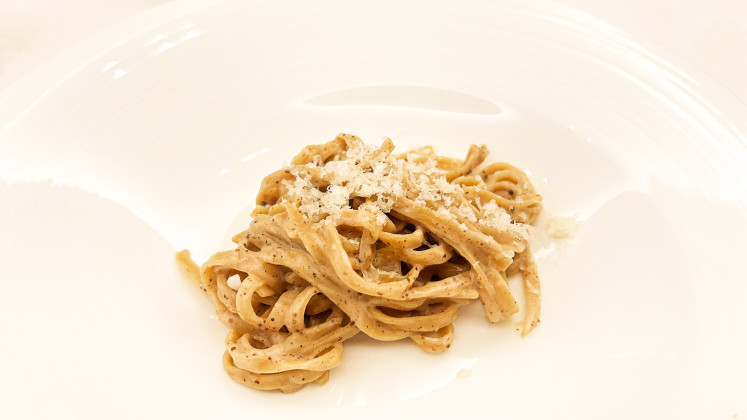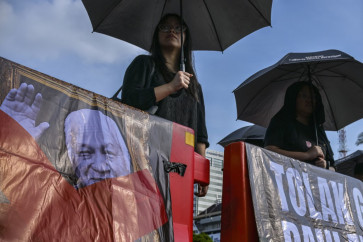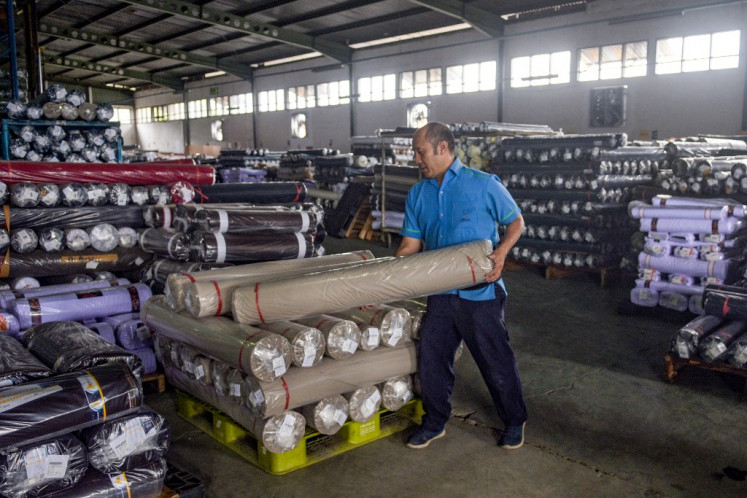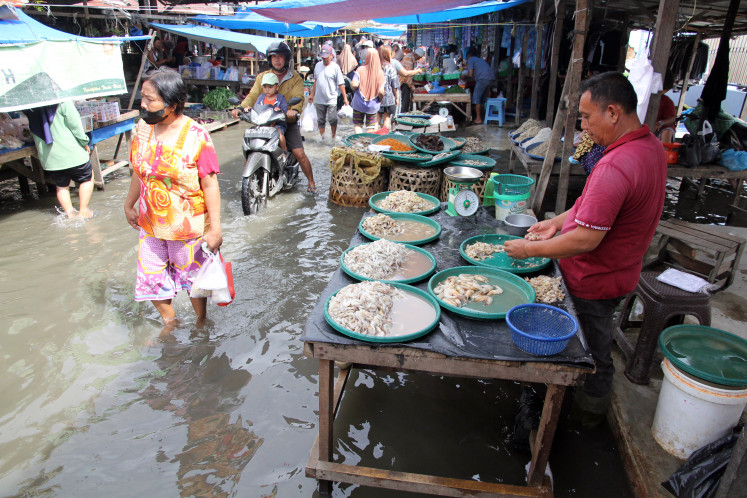Popular Reads
Top Results
Can't find what you're looking for?
View all search resultsPopular Reads
Top Results
Can't find what you're looking for?
View all search resultsSchool dropout becomes Indonesia's most 'prestigious farmer'
On Aug. 17 last year, he was selected as Indonesia’s most ‘prestigious farmer’ after winning regional awards in Batang and Central Java. The Agriculture Minister Amran Sulaiman personally handed out the award to the accomplished farmer.
Change text size
Gift Premium Articles
to Anyone
“Education, by itself, does not determine a person’s success,” said Turjangun.
The 46-year-old resident of Manggisan village in Batang, Central Java, admits to dropping out of school at age 13 due to financial constraints.
On Aug. 17 last year, he was selected as Indonesia’s most ‘prestigious farmer’ after winning regional awards in Batang and Central Java. The Agriculture Minister Amran Sulaiman personally handed out the award to the accomplished farmer.
Turjangun’s path to success has been potholed with challenges. As a young teenager, he traveled to Salatiga in Central Java with an equivalent of Rp 60,000 (US$4.5) in his pocket, and used it to set up a toasted bread stall on the roadside. “With that initial capital I sent all my younger siblings to school, until they graduated in Salatiga,” he said during a workshop on organic fertilizer at his home.
In later years he became a floor-cleaner at the Wawasan newspaper office in Salatiga, with a salary that barely kept him alive. Despite other job offers coming in, he stayed on just so he could learn the inner workings of the press.
“I’m not well educated, so wherever there is knowledge I want to take hold of it,” said Turjangun. "When I see something I don’t understand I chase it. I will pay for it. My orientation is business—finding the right formula is not easy, it takes a lot of peeping around.”
Read also: Guarding the forest
In 2000, Turjangun took his hoe to half a hectare of land. He became leader of a local agricultural collective, and the indefatigable farmer started peeping around for solutions to two big problems: agricultural waste, and the cost of chemical fertilizers. He found his answer in biogas—a technology that converts livestock manure into a gas for fuel, and produces a liquid fertilizer as a by-product.
According to this father of two daughters, many communities in Indonesia are disrupted by agricultural waste. The stench of poorly handled cow manure seethes in the villages; the problem is hated, and avoided. “People rarely care about waste, but if we can make something of it, we should take care of it,” he said.
Turjangun’s search led him to become heavily involved with farmer’s federation Qariyah Thayyibah in Salatiga, where he regularly held meetings with the organization’s 15,000-odd members, encouraging them to shift to organic farming practices. “The overuse of chemical fertilizers reduces soil fertility; it also contributes to water pollution and can harm the farmer directly.”
During these years, Turjangun dabbled as a supplier to traditional medicine company Sido Muncul, began lecturing at the university STAIN in Salatiga near to where he used to be a hawker, and in 2012 received a national award from the Energy and Natural Resources Ministry for his work with biogas.
After leaving Qariyah Thayyibah in 2013, and settling for good in Batang, he began to consolidate his knowledge. “I already had a license to make fertilizer,” he said. “I had enough knowledge, and there was no [organic fertilizer] in Batang yet. I began with one bucket, two buckets, and then 50 buckets. I gave it to the local farmers, but no one wanted it because it came from waste. So I made a nice label, and sold it for Rp 10,000 a liter. Five or ten people bought it. I raised the price to Rp 25,000, and I sold a ton and a half. I raised the price again to Rp 45,000.”
In 2014, he entered his fertilizer into a competition carried out by the technology innovation foundation INOTEK. He won, and came home with $10,000.
Turjangun now makes his line of organic liquid fertilizer from rumen, the half-digested grass taken from a cow’s stomach after slaughter. His market stretches from Aceh in the west to Merauke in the east, and his company Lestari Makmur Nusantara is known to turn over Rp 975 million a month.
“My only capital has been recklessness,” Turjangun laughs. “But Insya Allah I can do it. I developed my own formula. When I got my [national organic certification] it was something they’d never seen before [...] You can make fertilizer using biogas, with rumen, with anything really, so long as it’s standardized and the lab results are consistent. The question is: how can we not fall asleep, but always keep learning?”
Read also: Lombok's Setanggor village, a must-visit for cultural enthusiasts
However, his line of work has its downsides. “I’m used to showering in manure,” Turjangun jokes. “Sometimes the hose can pop out and I get rained with fertilizer. My own child doesn’t want to help out, ‘it stinks!’ she says. Ah it really hurts, when your own child says such a thing, but what’s a businessman to do? That’s our livelihood.”
Today, Turjangun is teaching a workshop on organic fertilizer in his own warehouse. Behind him are ten giant 5,300 liters yellow drums, churning out tons of light-brown liquid for a range of different purposes. The smell of his finished product is sweet and fragrant, thanks to the addition of molasses, and a precise process of fermentation.
Turjangun’s giant leap into organics is not taken blindly. When asked about the future of organic farming, he refers to President Joko "Jokowi" Widodo’s promise outlined in the Nawacita—or ‘nine hopes’ agenda—to build 1,000 organic villages across the archipelago nation.
Agriculture Minister Amran Sulaiman has also recently encouraged the development of organic farming. “We will support [organic farming] because it is healthy, very popular, and the export demand is extremely high,” said Amran during a World Food Day event in Boyolali back in October 2016. Amran also revealed that the production of organic food in 2016 grew 67 percent compared to 2015.
The director of Investment for Indonesia’s state-owned enterprise PT Pupuk Indonesia Holding Company has too made a statement in favor of organic farming. On Dec. 23, 2016, Guzrizal wrote that, “The national capacity for organic fertilizer is still way below the demand, especially if we want to match it to our balanced fertilizer ratio of 5:3:2.” This ratio—5 parts organic fertilizer to 3 parts NPK to 2 parts urea—has been proposed by the government, and would see a boom in organic fertilizer if realized. (kes)
***
Joshua is a young freelance journalist from England. He specializes in success stories, and has written extensively for the Yayasan Rumah Energi in Indonesia. He loves many things about the world – sustainability, organics, people and traditions – and wants to spread positivity through his work. He can be reached at mail@joshuaparfitt.com.
---------------
We are looking for information, opinions, and in-depth analysis from experts or scholars in a variety of fields. We choose articles based on facts or opinions about general news, as well as quality analysis and commentary about Indonesia or international events. Send your piece to community@jakpost.com. For more information click here.

